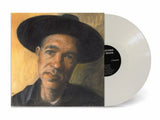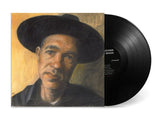Simon Joyner - Pocket Moon LP
PLEASE NOTE: For Europe & UK this album is being co-released and shipped though BB*IISLAND and for Australia and New Zealand co-released through Homeless Records. Just use this link for your order and you will also save money on shipping. All copies are from the same manufacturers. Also, you can preview the first single, Tongue of a Child, HERE!
POCKET MOON IS AVAILABLE IN STANDARD BLACK VINYL OR "TRANSLUCENT MARBLE MOON" COLORED VINYL (LIMITED TO 150 IN THE USA) FOR AN ADDITIONAL $2. BOTH COME IN A GATEFOLD JACKET. IT'S ALSO AVAILABLE ON CD IN A DELUXE GATEFOLD DIGIPACK PACKAGE WITH LYRIC BOOKLET.“Singer-songwriter” is a frustratingly confining term; to truly understand exactly just how confining, look no further than the recorded works of Simon Joyner, an artist whose work consistently transcends the narrow parameters of genre classifications and record shop bin cards. Though his music has always honored, reckoned with—wrestled with—the tradition set forth by his songwriting forebears (Cohen, Van Zandt, Ochs, Dylan, Reed to name a few), Joyner can always be counted on to defy expectations; as a lyricist, melodicist, and arranger, Joyner likes to keep us on our toes.
For his new album Pocket Moon, Joyner opted to engage in a risky artistic challenge. Instead of leaning on his fertile pool of Omaha musicians (the amorphous Ghosts band), he asked friend and frequent collaborator Michael Krassner to assemble unknown players on his behalf specifically for this recording. He then traveled from his home base to Krassner’s “7-Track Shack” studio in Phoenix to record the album, abandoning the literal and figurative comfort zone of old habits and home field advantage. Simultaneously sparser and more immediate than 2017’s obliquely topical Step Into The Earthquake, Pocket Moon is instantly one of Joyner’s finest albums since his redoubtable 2012 double album masterpiece, Ghosts, or to some ears the excellent, sonic 180 he managed with his follow-up, Grass, Branch & Bone. Krassner’s wrecking crew is sturdy, versatile, and complementary. Utilizing a wide range of instruments and textures, the band contributes additional nuance to each of the ragged, sublime songs here. Throughout, Krassner emerges as the Lee Underwood to Joyner’s Tim Buckley: a sympathetic foil and musical empath who comes to Joyner’s music with not only the intuition born of years of collaboration and friendship (he’s produced nearly all Joyner’s albums since 1998’s “Yesterday, Tomorrow and In Between” after all), but also with a highly evolved musical ear. The result is another song cycle stylistically unified, dynamic and rich.
Of course, there are also the lyrics. As a wordsmith Joyner belongs to a very exclusive group of living songwriters whose written lyrics on the page seem to suggest their own distinct, internal music. Pocket Moon—a decidedly more personal album than its predecessor—continues Joyner’s habit of “naming names.” As on previous albums, Pocket Moon contains songs that explicitly mention Joyner’s friends, family members, bandmates, and even neighbors. Habitual lyric sheet perusers will also note that Joyner is well acquainted with the mechanics of poetic form: the marvelous “Blue Eyed Boy” is written in something of an irregular pantoum; elsewhere, Joyner gracefully deploys personification, metaphor, and reification like some cornhusking John Ashbery: stars twinkle out of nervousness and cicadas mimic the radiator; coyotes throw confetti. Joyner—never one to resort to trite whiskey confessions or inscrutable word salad—tempers his spiritual, philosophical, and existential observations with a stand-up comic’s sensitivity to some of the smaller, less noticed things. Imagine the raw humanity of Tim Hardin or the deathless wisdom of Leonard Cohen rendered via the consolatory ramble of a drug buddy’s “hey, didja ever notice…”
Pocket Moon finds Joyner’s myriad powers undiminished, his legacy assured, his muse dogged and insatiable, his writing sharper than ever. As his narrator reminds us in the devastating song “Tongue of a Child,” “...everything looks clean when you stand back so far, a swallowtail shredding its wings against the sides of this jar.” This is music as mindfulness: Joyner is unwilling to simply report the sweeping gestures but instead observes the violence, beauty, and absurdity of everyday life up close and dares you to join him in laughing at it, ruminating on it, or running from it screaming.
-James Jackson Toth (Singer-songwriter/Wooden Wand)




